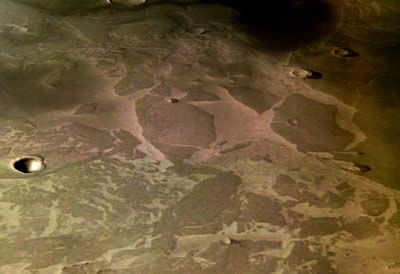Images of Elysium plains seem to show ice floes.

The Mars Express spacecraft, currently orbiting the red planet, has taken snapshots of what appears to be a dust-covered frozen sea.
The pictures, taken by the High Resolution Stereo Camera on board the European Space Agency's craft, show a flat plain close to Mars's equator that is covered with irregular blocky shapes. They look just like the rafts of fragmented sea ice that lie off the coast of Antarctica. The camera team presented its findings at ESA's Mars Express Science Conference in Noordwijk, The Netherlands, on 21 February. The results will be published by Nature in March.
"I was expecting glaciologists to be sceptical of our interpretation," says team member John Murray of the Open University in Milton Keynes, UK. "But when I showed the pictures to an expert on sea ice, he was utterly convinced."
The researchers think that the camera has snapped a sea that froze about 5 million years ago, and was then covered by volcanic dust.
"Five million years might sound like a long time," Murray says, "but in geological terms it is virtually yesterday. This suggests that pockets of liquid water have existed throughout Mars's geological history."
Fissure farm
The ice-raft features were seen about 5° north of the equator in a region called Elysium, which contains several enormous martian volcanoes. In the past, parts of Elysium have been flooded with both lava and water from deep fissures called the Cerberus Fossae.
"These cracks go down several kilometres to a water-rich layer," says Murray. Ancient floods of water have carved channels into the rock. But no one expected that any of the water would remain frozen on the planet's surface to this day.
The atmosphere of Mars is so thin that ice should simply sublime, evaporating without melting in the equatorial sunlight. But the team think that their frozen sea is insulated by a layer of volcanic dust, through which water vapour escapes only very slowly.
They suggest that the ocean formed from water gushing out of the Cerberus Fossae and, as it started to freeze, floating pack ice broke up into rafts. These became covered in dust from volcanic eruptions in the region.
While the entire sea froze solid, the ice between the rafts, which was unprotected by dust, sublimed to leave 'ice plateaus' surrounded by bare rock. The sparse cratering of this region shows that it cannot have formed more than about 5 million years ago.
Lively hopes
Another, more mundane possibility is that the blocks now visible in the plains of Elysium are not ice at all, but rock formed from solidified lava. However, Murray says that they do not look anything like lava features seen elsewhere on the planet. A volcanologist himself, he says: "I have spent 38 years looking at lava. I know what lava can do."
The 'frozen sea' is a mere 45 m deep and 800 by 900 km in area: about as big and as deep as the North Sea off Britain's coast on Earth. The MARSIS radar detector on Mars Express, which is scheduled to be deployed in April or May, is designed to search for reservoirs of water on or below the Martian surface. But sadly its resolution is slightly too low to be able to confirm whether such thin sheets are actually made of ice.
Murray says that the area is likely to be a priority for future studies of Mars, because if there is a deep layer of liquid water below the Cerberus Fossae, life could still exist in it. "This is where we'll find life, if it's there," he asserts.
Disgorged on to the surface in the floods that created a sea, the remains of such organisms might now lie frozen in the dust-covered ice. The European Space Agency is planning to send a lander mission to Mars at the end of the decade to look for life, and this icy area would make an ideal target, says Murray.
http://www.nature.com/news/2005/050221/full/050221-7.html
|